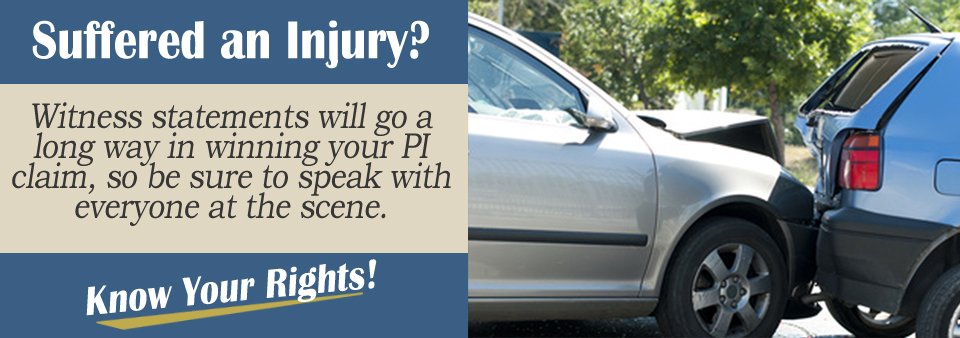When it comes to proving fault in a car accident, it is often your word against the other driver. No one is going to readily admit fault as it can negatively impact your ability to seek compensation for any damages you may suffer because of the accident. You need that third-party statement to help boost your own credibility, and that is where witness statements help.
We have asked attorney, Alaina Sullivan, about what you should do. Here is what she had to say:
The Benefits of Witness Statements
The beauty of witness statements is they are from people who are uninvolved and unbiased. Witnesses statements do not include those from the drivers or passengers. They are statements from people who saw the accident happen but do not necessarily personally know the participants. These individuals have no financial or personal interest in the outcome. That lack of personal interest only adds to that person’s credibility in the eyes of the court or of insurance adjusters.

Talk to Strangers
You have always been told to not talk to strangers, right? Well, when it comes to car accidents, that could not be any farther from the truth. People will stop to ask if you are okay or ask if you need a statement. Talk to them. Make sure you see what their point of view was of what happened. Get a written statement or have that person stay to speak with the police. It might not be the first thing on your mind, but it will pay off in the end.
Who are Good Eyewitnesses?
Be aware of who is around you after an accident. If you are not seriously injured and can talk to others, look around and see who possibly saw what happened. Eyewitnesses can include other drivers who saw what happened or other drivers who stopped to help you. If you are in front of any businesses, see if any of the business owners, their employees or customers saw what happened. Eyewitnesses can also include passersby who happened to see the accident as it occurred or road or utility workers.
Make Sure They are Neutral
Eyewitness statements are only helpful if they are from truly unbiased individuals. If the other person is related to you or the other driver, he or she will likely have their own personal bias. That may come out in trial if that person is called to testify and that information can be used to discredit the witness and hurt your case.
What to do When Speaking With Witnesses
Do not, I repeat, do not try to sway the witness. When you are speaking with that person, ask them general questions. Do not try to steer them in any way against the other driver or ask questions like “you saw what that guy did, right?” If the witness feels pressured at all, that will come out and can hurt you in the end. Also, make sure you have the person write the information down. It does not have to be a formal affidavit, but have him or her write down what he or she saw in as much detail as possible, and make sure that person signs and dates what is written. Also, be sure you get that person’s contact information because your attorney will want to talk to the witness later should you need to go to court. Get a home address, phone number and email address.
Have the witness talk to the police to get their statements on the police report as well. A third-party giving an unbiased statement to an authority, third-party figure will add even more credit to what the witness says. If possible, make sure the witness talks to the police. Keep in mind that while the police are supposed to be accumulating evidence when investigating, they are not obligated to speak to all witnesses available. It is your responsibility to make sure that happens.
Contact an Attorney Today
A licensed personal injury attorney will be able to evaluate your case and determine if you have a claim against the other party’s insurance company. For the best chance of receiving the compensation you need to pay for medical bills, auto body bills, and pain and suffering, you should speak with a personal injury attorney in your area today.